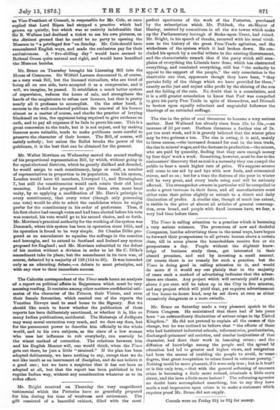Mr. Walter Morrison on Wednesday moved the second reading -of
his proportional representation Bill, by which, without going in -for equal electoral districts, which he greatly disliked and dreaded, he would assign to each constituency, large or small, a number -of representatives in proportion to its population. On his system, London would have 62 members, Liverpool 11, and Birmingham 1, but still the constituencies would each retain their old local meaning. Indeed he proposed to give them even more local unity, by so applying a modification of Mr. Hare's principle to every constituency, that every voter (though only possessing -one vote) would be able to select the candidates whom he might prefer for the constituency in his order of preference. Thus, if his first choice had enough votes and had been elected before his vote was counted, his vote would go to his second choice, and so forth. Mr. Morrison's practical authority for the working of the system was Denmark, where this system has been in operation since 1855, and its operation is found to be very simple. Sir Charles Dilke pro- posed as an amendment to equalise the suffrage in the counties -and boroughs, and to extend to Scotland and Ireland any system proposed for England ; and Mr. Morrison submitted to the defeat of his motion without a division in order to let Sir C. Mike's amendment take its place; but the amendment in its turn was, of c ourse, defeated by a majority of 128 (154 to 26). It was intended -only as an educating debate,—a debate to moot principles, not with any view to their immediate success.


































 Previous page
Previous page